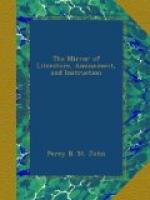* * * * *
The famous Duke of Cumberland showed more cleverness as a boy, than he ever did as a general. Having displeased his mother one day, she sent him to his chamber, and when he appeared again, she asked him what he had been doing. “Reading,” replied the boy.—“Reading what?”—“The Scriptures.”—“What part of the Scriptures?”—“That part where it is written, ‘Woman! what hast thou to do with me?’” After the loss of a battle, an English prisoner observing to a French officer, that they might have taken the duke himself prisoner; “Yes,” replied the Frenchman, “but we took care not to do that—he is of far more use to us at the head of your army.”—Georgian Era.
* * * * *
The letter Y.—Pythagoras used the Y as a symbol of human life. “Remember (says he) that the paths of virtue and of vice resemble the letter Y. The foot representing infancy, and the forked top the two paths of vice and virtue, one or the other of which people are to enter upon, after attaining to the age of discretion.”
P.T.W.
* * * * *
Royal Combat.—Near the city of Gloucester, on the Severn, the river dividing, forms a small island called Alney, which is famous for a royal combat fought on it, between Edmund Ironside and Canute the Dane, to decide the fate of the kingdom, in sight of both their armies. Canute was wounded, when he proposed an amicable division, and accordingly he obtained the northern part; the southern falling to Edmund.
E.F.
Effect of Music.—A Scotch bag-piper traversing the mountains of Ulster, in Ireland, was one evening encountered by a starved Irish wolf. In his distress the poor man could think of nothing better than to open his wallet, and try the effects of his hospitality; he did so, and the savage swallowed all that was thrown to him, with so improving a voracity as if his appetite was but just returning to him. The whole stock of provision was, of course, soon spent, and now his only recourse was to the virtues of his bagpipe; which the monster no sooner heard, than he took to the mountains with the same precipitation he had left them. The poor piper could not so perfectly enjoy his deliverance, but that, with an angry look, at parting, he shook his head, saying, “Ay, are these your tricks? Had I known your humour, you should have had your music before supper.”—Bowyer’s Anecdotes.
* * * * *
Epitaph on Mr. Nightingale, Architect.
As the birds were the first of the architect
kind,
And are still better builders
than men,
What wonders may spring from a Nightingale’s
mind,
When St. Paul’s was
produced by a Wren.
* * * * *
Poets.




